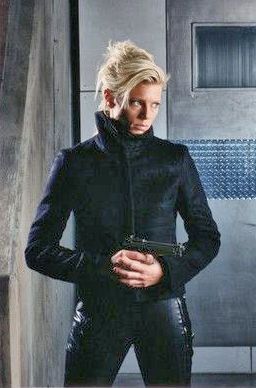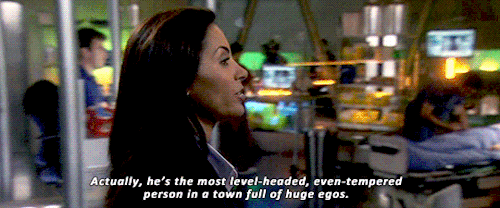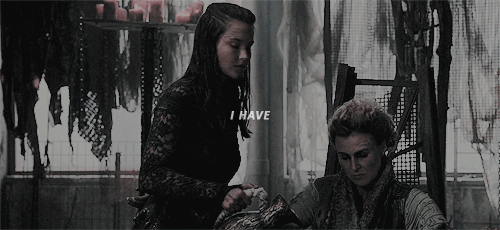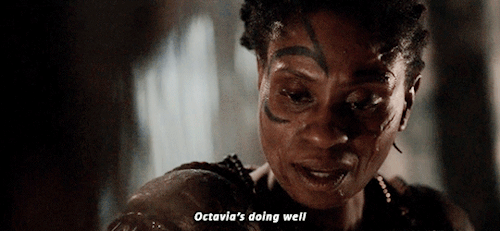#The one viable approach is basically Action The Handsmaid's Tale
Explore tagged Tumblr posts
Text
Re: LFN specifically: Part of the issue, I believe, is that the audience was in many ways just picking up what the writing was putting down. Among the people who don’t seem to care for Nikita are the show’s writers themselves, who, like the fans you mention, also like Michael more than they do Nikita—or at the very least are much less ambivalent.
Like, to be clear, I haven’t watched the whole series—just over half of it, probably? Still, the number of scenes that we get that present Michael as just the coolest agent ever is far greater than the number of comparable scenes we get to see with Nikita. Even during the show’s final seasons, in which one would assume Nikita is at her most capable, we still consistently see that Michael is able to run rings around her, and his tendency to treat her as a partner or equal is seen as neutral to good. Consequently, when the series does attempt to claim that Nikita is a superlative agent, it is rarely convincing—see the end of season four, where her escape from the Section is undone within an episode.
This particular element might not have mattered much if Nikita’s compassion and empathy were presented as assets just as important as Michael’s tradecraft (although that would still be a very gendered split) but this is more often than not not the actual case. In how many episodes does the solution to an episode’s crisis actually hinge on Nikita’s compassion? The one with the pizza vendor witness in season one, the second Helmut Volker ep, and… (I’m not being snarky: I don’t actually remember). In how many episodes does her anger at the Section lead her to take actual effective action? Conversely, how many episodes present Nikita’s compassion as an actual liability? The season one finale is a big one, although there are others—this is the series where Nikita believing a purported rape victim is presented as the wrong choice. The Section’s standard operating procedure, meanwhile, is presented as ultimately correct even when it makes no damn sense.
(There is, actually one way Nikita’s Nikitaness is presented as an unambiguous boon: insofar as it allows her to make friends willing to sacrifice themselves for her. This, however, is muddled heavily by the admission that most if not all of her friends are this way because they all, to varying degrees, want to get into her pants, meaning that her hotness is at least as relevant as her compassion. That Nikita makes no effort to create or maintain relationships with other women, after Carla and Madeline in the first season, does not help at all—it ultimately only helps objectify Nikita and treat her attractiveness as the most important thing.)
None of this means that Nikita deserved all of the antipathy she got, simply for being a woman with human foibles—nor does it mean that she wouldn’t have been treated that way if the series had been more consistent in its writing: she likely might have been! But at is, the fandom’s sexism is at least partly a reflection of the writers’.
Is fandom sexist or is the writing for male characters better?
Either way, female characters often get reduced to a single trait or act rather than taken as a glorious whole and headcanoned into cinnamon rolls. Name five female characters you think deserve a different reception than they got and tag five people.
(tagged by @johnmurphysreddit)
1. From my first headlong fall into fandom, my original OTC and OTP - Peta Wilson’s Nikita, from La Femme Nikita the Series (1997-2001).

She was the protagonist, the title character (!), the show was about her and her story and her journey. I fell headlong for her in the first episode I watched - was I think 1.03 - she was strutting to take on a child slaver/drug dealer and all around bad guy she’d been set up to be impressed by (and was) but she’d figured it out, she was all alone, in this amazing simple red dress with a trench coat swirling around her legs through the fog … and OMG. I was hers forever. She was angry, she was vulnerable, she was tough and strong - she’s actually quite tall and fit so it was believable that with the constant intense physical training she was shown doing, in nearly every episode, that she could hold her own, she broke more than once and then pulled herself back together again, she stayed full of empathy and righteous anger for the powerless and the oppressed - and full of fury at the powerful who ignored all the people they hurt, even as her own power grew and she had to confront head on the difficult balance of choosing. She didn’t always chose well or wisely, but she never stopped trying, and she learned from her mistakes and made new choices each time around.
But holy moley… so much of the fandom fell so freaking hard for her male mentor/teacher/partner/lover - and decided she just wasn’t good enough for him. Largely because - and this will sound all too familiar - his plot served hers. She wasn’t deferential enough. She had her own story. She actually got mad at him when he hurt her, lied to her, set her up to be played by everyone and their cousin, to be pimped out by him or their superiors (like for real). Fans *hated* her - even though at teh same time they mostly shipped them together as she was most clearly framed as the best ‘prize’ for him on offer in the show. They called her a bimbo and a brat and a spoiled child.
And twenty years later its still impossible for me to write a short sentence about why I love her so, and why her detractors were SO SO wrong to reduce her to some simple caricature of a spoilt teen.
2. Allison Blake, Eureka, 2006-2012.

Allison is *everything* - brilliant, beautiful, kind, capable, loving, mother of a special needs child (well, until the s4 reboot, when she’s the mother of an active and irrepessible teen + a new baby) - and while absolutely confident in her professional life, her romantic life has been a bust, in part becuase of her professional success, and in part because of accident and tragedy, and her insecurities and wounds about her desirabliity and her fears about her mothering of her autistic son made her so real. Also of course, she’s a proudly African American woman - though they handled that so well (IMO) by largely playing it absolutely straight and without comment. The male protagonist Jack very sensibly fell in love with her the first moment he saw her - and spent years working up the courage to approach her, delayed by the adventures of the week/season.
Naturally a huge portion of the fandom immediately shipped Jack with the obnoxious white man (Ed Quinn - who is very pretty, I grant them that - see S2 of the new ODAAT) who spent all his time being as rude and condescending as possible to Jack - and handled this in meta and chat and fic by making Allison out to be a harpy, a bitch, a bad mother, a grasping divorcee, or WORST OF ALL - BAD AT HER JOB. I hated all of them.
3. Echo, The 100

See all the Echo positivity meta basically. I’ve admired her since we first saw her - but she cockblocks a fannishly popular pair. So. Pick your unfortunate adjective and it’s been applied to her as the entirety of her character.
4. Ontari (and Nia, too), The 100

For a show that is pretty solidly dedicated to the propisition that there are no wholly ‘good’ or wholly ‘bad’ characters - everyone does what they believe necessary for their people - and a fandom that absolutely embraces this in defense of their faves, for these two women in particular fandom has had no problem dismissing them as nothing but one dimensional cackling evil bitches. Yes - they were antongists - but why is Dante Wallace a charming snake, and Roan everyones’ favorite fuck boy (okay, mine too) but his mother and his mother’s righthand nightbood nothing but cartoon villians? Ontari in particular seems ripe to me for all kinds of woobification and justification - and had she been a boy, I think s/he would absolutely have had it.
5. Indra, The 100

Indra has - on screen, in dialogue - been given a lot of characterization. She is by turn angry, defensive, kind, remorseful, grieving, afriad, warm, loving, full of good humor, even has mother anguish and mother guilt. She has plenty of backstory. She also acts in whatever she percieves to be her own interests more than once, openly or covertly defing her leadership.
But in fandom - she’s nothing but stoic warrior who dutifully serves whichever white girl is in charge. And they love her for it. It’s a very weird complaint I know - I almost didn’t make it - because her fannish rep is positive on the whole. But it’s entirely one dimensional, even though there is so much more to her in her portrayal in canon, and her allegiances and her emotions move plot - all the time, season after season. She’s a vital character.
#LFN#La Femme Nikita#Nikita (Peta Wilson)#It's a genuinely hard nut to crack.#You can't have Nikita as consistent character without fundamentally changing the premise of the series.#A Nikita who is an effective rebel is one who gets canceled.#A Section open to understanding that empathy and compassion are useful tools does not need Nikita to teach them that.#The one viable approach is basically Action The Handsmaid's Tale#Which is arguably not something that works in TV
20 notes
·
View notes